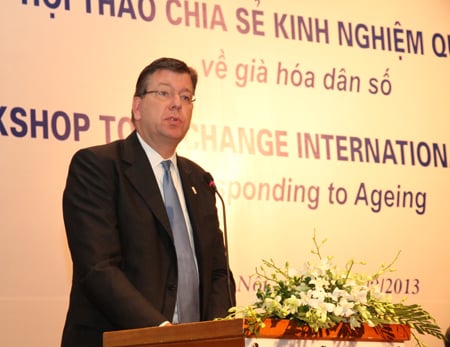Ha Noi, 25 September 2013 – The world is growing old fast. In the next 10 years, the number of people over 60 years of age will surpass one billion. Population ageing presents societies with great opportunities but also huge challenges. To address the challenges and maximize the opportunities, more joint efforts are needed to ensure inclusion of ageing and the needs of older persons in all national development policies and programmes, emphasized the leaders of the Ministry of Health and the United Nations Population Fund (UNFPA) in Viet Nam at the national workshop organised today in Ha Noi to share international experiences on policy and action responses to population ageing.
Population ageing is happening in all regions and in countries at various levels of development. It is progressing fastest in developing countries, including in those that also have a large population of young people. Of the current 15 countries with more than 10 million older persons, seven of these are developing countries.
It is estimated that the number of older persons in the Asia-Pacific region will triple from 419 million in 2010 to more than 1.2 billion by 2050. By this time, one in four people in the region will be over 60 years old. This transition will be more pronounced in East and North-East Asia, where more than one in three people will be older than 60 years by 2050. Viet Nam's population is among the fastest ageing countries in Asia. In 2012, the proportion of older persons in the total population is 10.2 per cent.

According to international and national experts at the workshop, there are many challenges to be addressed regarding ageing, including income insecurity, inadequate social protection, limited capacity of health systems to address the range of chronic conditions facing older persons, the human resource gaps in meeting the needs for elderly care services, in particular, long-term care, and the provision of an age-friendly environment to encourage the active participation of older persons for the betterment of society as a whole.
According to data from the Viet Nam Ageing Survey in 2011, 39 percent of older persons are still working, with the rural and female older persons having a significantly higher rate of labour force participation than their urban and male counterparts. However, most older persons are self-employed in agricultural activities with low and unstable income. 17 per cent of older persons are living under the poverty line. Female, rural, and ethnic minority older persons are more vulnerable to poverty than their male, urban, and Kinh counterparts.
However, population ageing creates many opportunities. Older persons play crucial roles in supporting families and communities. Whether through giving such support or through directly engaging in economic activity, older persons also contribute to the economic well-being of society. Experiences and lessons learned from other countries suggested that Viet Nam needs realistic policies and strategies which should be designed and implemented using evidence on the relationship between ageing population, economic growth, culture and the specific social service’s needs for the older persons, including health care.
Taking care of older persons is an important policy component that the Government of Viet Nam has emphasized at all stages of the country’s development. Since the first Constitution in 1946, older persons have been an important part of social and economic policies and programmes. As the National Action Plan on Older Persons 2012-2020 was approved last year, older persons-related issues have been integrated into the Government's programmes and policies. However, the number of older persons continues to increase, Viet Nam needs realistic and appropriate policies and strategies designed and implemented to ensure older persons' issues and needs are included in the country's policies and socio-economic development plan.
Inspiring presentations from China, Japan, Thailand, South Korea, Taiwan, and Israel provided participants with more understanding about the population ageing, policies and interventions. The current problems occurring in aged countries like Japan, South Korea among others provided valuable lessons for Viet Nam when preparing strategies, policies and programmes to respond to this important issue. Viet Nam can and should be planned for in order to transform the challenges into opportunities to ensure the well-being of older persons and to enlist their meaningful participation in society so we can all benefit from their knowledge and ability.
Ageing is a lifelong process that does not start at age 60. Today's young people will be part of the 2 billion-strong population of older persons in 2050. A better world for younger people today will mean a better world for older persons in 2050.
"The older persons of today were young some years ago, and that the young people of today will be the next generation of older persons. Thus, investing in young people’s health, education, participation and decent employment is important in dealing with the needs of future generations of older persons,” emphasized Mr. Arthur Erken, UNFPA Representative in Viet Nam at the workshop.
The workshop provided recommendations for the way forward to ensure a society for all ages in which both young and old are given the opportunity to contribute to development and share in its benefits.
For further information please contact:
Ms. Nguyen Thi Hong Thanh
One UN Communications
Tel: (84-4) 3822 4383 – Ext: 117
Mob: 0913 093363
Email: tnguyen@unfpa.org


